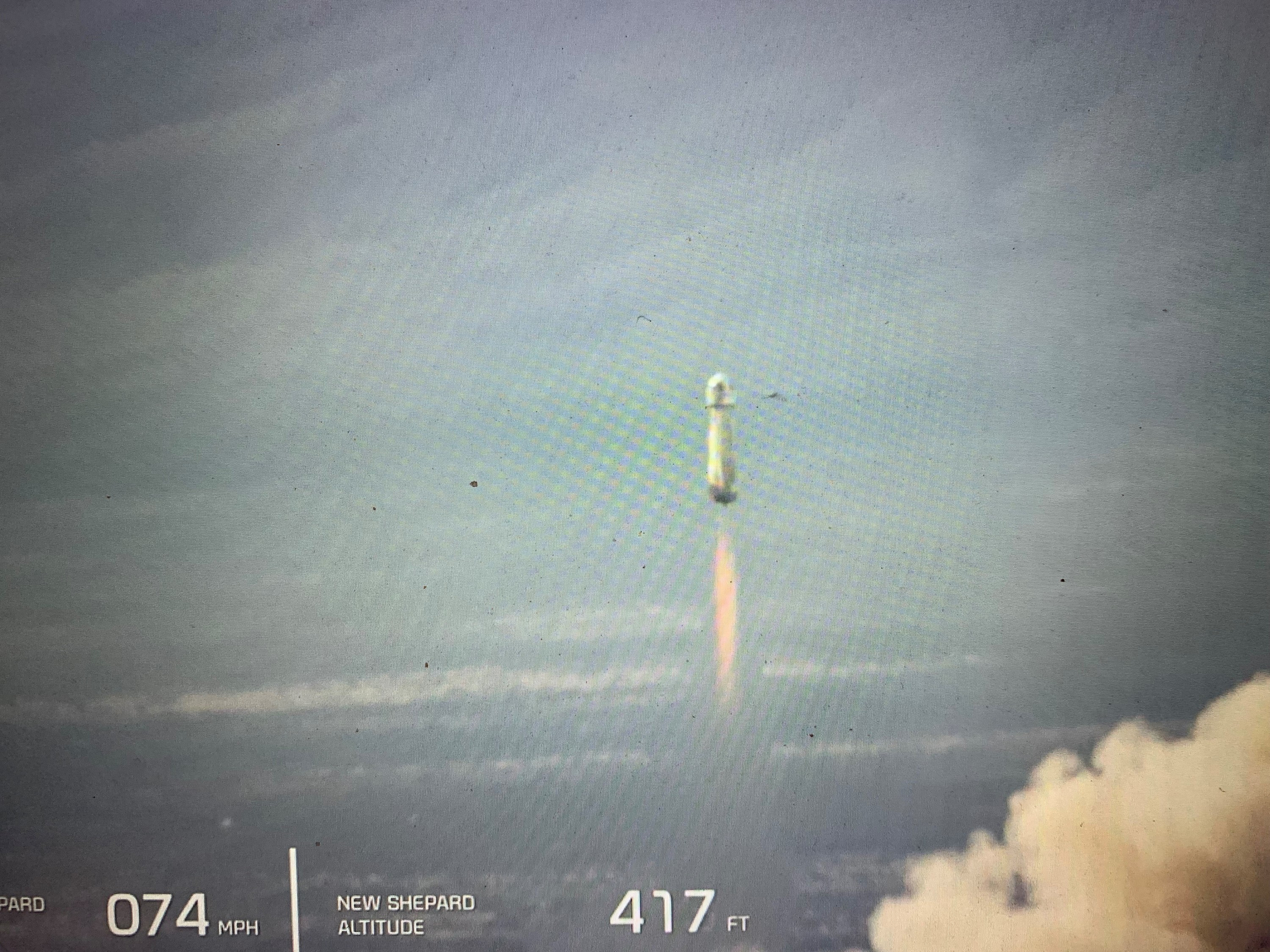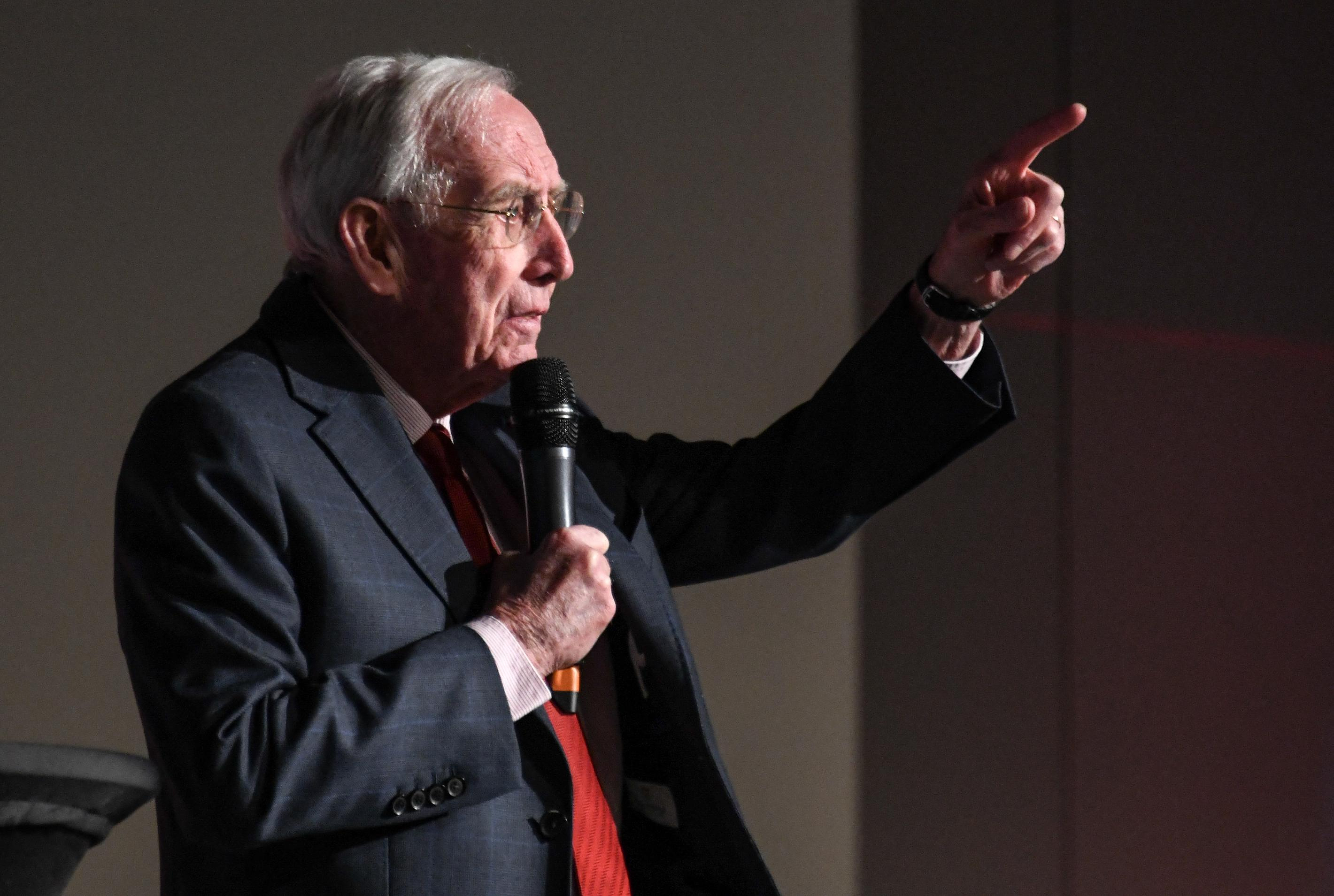Successful return to flight for the New Shepard. The small reusable rocket from Blue Origin, the space company of Jeff Bezos, the founder of Amazon, took off this Tuesday at 5:43 p.m. (Paris time), from its launch pad located at the Van Horn space base in Texas. The flight, planned the day before, had been postponed by 24 hours, after the discovery of an anomaly in “ground systems”, according to the company. On board the NS-24 mission, no space tourists but 33 scientific payloads, more than half of which were developed with the support of NASA, and 38,000 postcards from the Club for the Future, sent by students from around the world .
This return to service of the New Shepard comes more than a year after the accident in September 2022, which resulted in the crash of the launcher a few minutes after takeoff, while the capsule was ejected and fell back to earth after having opened his parachutes. The accident caused no casualties, with no space “tourists” on board.
The investigation launched by the American Aviation Safety Agency (FAA) and NASA, as well as analyzes carried out by Blue Origin engineers, showed that “the direct cause of the accident came from a thermo-structural failure of the BE-3PM engine nozzle (the power module, Editor’s note) during propulsion”. Blue Origin has made fixes, including “combustion chamber design changes.” The FAA confirmed last Sunday that it had approved a new flight license for the small modified rocket.
Also read: Jeff Bezos' Washington Post sinks into crisis
However, since the first flight carrying passengers, including Jeff Bezos himself, in July 2021, New Shepard has already transported 31 tourists to the frontiers of space, some 100 km from Earth. For a few minutes, they were able to experience weightlessness and admire the curvature of the Earth. With the success of the NS-24 mission, Blue Origin plans to resume commercial flights in early 2024. That is, more than six months after the relaunch of tourist missions organized by its competitor, Virgin Galatic, during the Galatic 02 mission last August. Although criticized, these suborbital ballads are in high demand. “Thousands of people participate in the auction process” to buy a ticket, Bob Smith, CEO of Blue Origin, recently assured. Demand is such that the space company can “easily double” the number of manned missions compared to those carried out in 2021. Between July 2021 and April 2022, New Shepard took off four times with tourists on board. The company does not provide pricing but has already stated that it is aiming for a target price of $250,000 per seat. For its part, Virgin Galatic specifies that it has more than 800 “tourists” on the waiting list, who have paid between 200 and 250,000 dollars.
Blue Origin therefore returns, in 2024, to the race for suborbital space tourism. The year also promises to be crucial for its other programs. In particular for the New Glenn, its reusable heavy launcher, whose maiden flight is planned for 2024, just like that, also highly anticipated, of the new European rocket Ariane 6, whose first takeoff is scheduled to take place between June 15 and 31 July 2024. Developed since 2012, the New Glenn, like Ariane 6, is four years behind its initial schedule. Blue Origin is expanding its manufacturing, assembly and test facilities just a stone's throw from NASA's Kennedy Space Center. Objective ? Increase the production and testing rates of the BE-4 liquid oxygen methane engine, which will also equip the Vulcan Centaur, the heavy launcher developed by ULA, a joint company between Lockheed and Boeing. The Vulcan must also take off for the first time in 2024, but before the New Glenn, since its maiden flight is planned for January.
Also read: SpaceX, Starlink, Blue Origin, Virgin Galactic... Towards the privatization of space?
These three rockets were chosen by Jeff Bezos to deploy Kuiper, Amazon's high-speed internet constellation. Time is running out: the first Kuiper satellites should have been launched from 2024. Which seems complicated, given the delays incurred by the three launchers. Two Ariane 6s are due to take off in 2024, but none for the American constellation. However, in order to retain the license granted by the American telecoms watchdog, Amazon must have put into orbit, by 2026, at least half of the 3,236 planned satellites. Another launch that appears threatened is the sending of two small probes, carrying instruments for measuring the magnetic fields and plasmas of Mars, by the New Glenn, chosen by NASA in 2023, as part of the Escapade mission.
Meanwhile, SpaceX continues to launch with metronome regularity. Sometimes with two launches on the same day: on December 28, Elon Musk's space company plans a Falcon 9 takeoff to deploy a new batch of satellites dedicated to its Starlink constellation as well as a launch (the 5th of the year) of the Falcon Heavy, the heavy version, to launch into geostationary orbit (GEO, 36,000 km from Earth), the military shuttle X-37B, developed under the supervision of the US Air Force and the American Space Command. At the beginning of December, SpaceX had also carried out 86 Falcon 9 launches and two takeoffs from Starship, its giant rocket. The company is well on its way to achieving its 2023 target of 100 shots compared to 61 in 2022. An absolute launch record in a single year. Enough to make Elon Musk jubilant: “the objective is to carry out 10 Falcon flights per month by the end of the year, then 12 per month next year”, he declared on X (ex-Twitter ), this autumn. Affirming at the same time that SpaceX will have delivered “around 80% of terrestrial payloads into orbit in 2023, China around 10% and the rest of the world, also 10%”. An ultra-domination which worries satellite operators who hope to see competition broaden with the commissioning of Ariane 6, the New Glenn and the Vulcan Centaur.

 Poland, big winner of European enlargement
Poland, big winner of European enlargement In Israel, step-by-step negotiations for a ceasefire in the Gaza Strip
In Israel, step-by-step negotiations for a ceasefire in the Gaza Strip BBVA ADRs fall almost 2% on Wall Street
BBVA ADRs fall almost 2% on Wall Street Ukraine has lost 10 million inhabitants since 2001... and could lose as many by 2050
Ukraine has lost 10 million inhabitants since 2001... and could lose as many by 2050 Sánchez cancels his agenda and considers resigning: "I need to stop and reflect"
Sánchez cancels his agenda and considers resigning: "I need to stop and reflect" The Federal Committee of the PSOE interrupts the event to take to the streets with the militants
The Federal Committee of the PSOE interrupts the event to take to the streets with the militants Repsol: "We want to lead generative AI to guarantee its benefits and avoid risks"
Repsol: "We want to lead generative AI to guarantee its benefits and avoid risks" Osteoarthritis: an innovation to improve its management
Osteoarthritis: an innovation to improve its management Ukraine gets a spokesperson generated by artificial intelligence
Ukraine gets a spokesperson generated by artificial intelligence The French will take advantage of the May bridges to explore France
The French will take advantage of the May bridges to explore France Organic flour contaminated by a recalled toxic plant
Organic flour contaminated by a recalled toxic plant 2024 Olympics: Parisian garbage collectors have filed a strike notice
2024 Olympics: Parisian garbage collectors have filed a strike notice Death of Paul Auster: Actes Sud says he is “lucky” to have been his publisher in France
Death of Paul Auster: Actes Sud says he is “lucky” to have been his publisher in France Lang Lang, the most French of Chinese pianists
Lang Lang, the most French of Chinese pianists Author of the “New York Trilogy”, American novelist Paul Auster has died at the age of 77
Author of the “New York Trilogy”, American novelist Paul Auster has died at the age of 77 To the End of the World, The Stolen Painting, Border Line... Films to watch this week
To the End of the World, The Stolen Painting, Border Line... Films to watch this week Omoda 7, another Chinese car that could be manufactured in Spain
Omoda 7, another Chinese car that could be manufactured in Spain BYD chooses CA Auto Bank as financial partner in Spain
BYD chooses CA Auto Bank as financial partner in Spain Tesla and Baidu sign key agreement to boost development of autonomous driving
Tesla and Baidu sign key agreement to boost development of autonomous driving Skoda Kodiaq 2024: a 'beast' plug-in hybrid SUV
Skoda Kodiaq 2024: a 'beast' plug-in hybrid SUV The home mortgage firm rises 3.8% in February and the average interest moderates to 3.33%
The home mortgage firm rises 3.8% in February and the average interest moderates to 3.33% This is how housing prices have changed in Spain in the last decade
This is how housing prices have changed in Spain in the last decade The home mortgage firm drops 10% in January and interest soars to 3.46%
The home mortgage firm drops 10% in January and interest soars to 3.46% The jewel of the Rocío de Nagüeles urbanization: a dream villa in Marbella
The jewel of the Rocío de Nagüeles urbanization: a dream villa in Marbella Europeans: a senior official on the National Rally list
Europeans: a senior official on the National Rally list Blockade of Sciences Po: the right denounces a “drift”, the government charges the rebels
Blockade of Sciences Po: the right denounces a “drift”, the government charges the rebels Even on a mission for NATO, the Charles-de-Gaulle remains under French control, Lecornu responds to Mélenchon
Even on a mission for NATO, the Charles-de-Gaulle remains under French control, Lecornu responds to Mélenchon “Deadly Europe”, “economic decline”, immigration… What to remember from Emmanuel Macron’s speech at the Sorbonne
“Deadly Europe”, “economic decline”, immigration… What to remember from Emmanuel Macron’s speech at the Sorbonne These French cities that will boycott the World Cup in Qatar
These French cities that will boycott the World Cup in Qatar Top 14: Fijian hooker Narisia leaves Racing 92 and signs for Oyonnax
Top 14: Fijian hooker Narisia leaves Racing 92 and signs for Oyonnax Europa League: Jean-Louis Gasset is “wary” of Atalanta, an “atypical team”
Europa League: Jean-Louis Gasset is “wary” of Atalanta, an “atypical team” Europa League: “I don’t believe it…”, Gasset jokes about Aubameyang’s age
Europa League: “I don’t believe it…”, Gasset jokes about Aubameyang’s age Foot: Rupture of the cruciate ligaments for Sergino Dest (PSV), absent until 2025
Foot: Rupture of the cruciate ligaments for Sergino Dest (PSV), absent until 2025
















